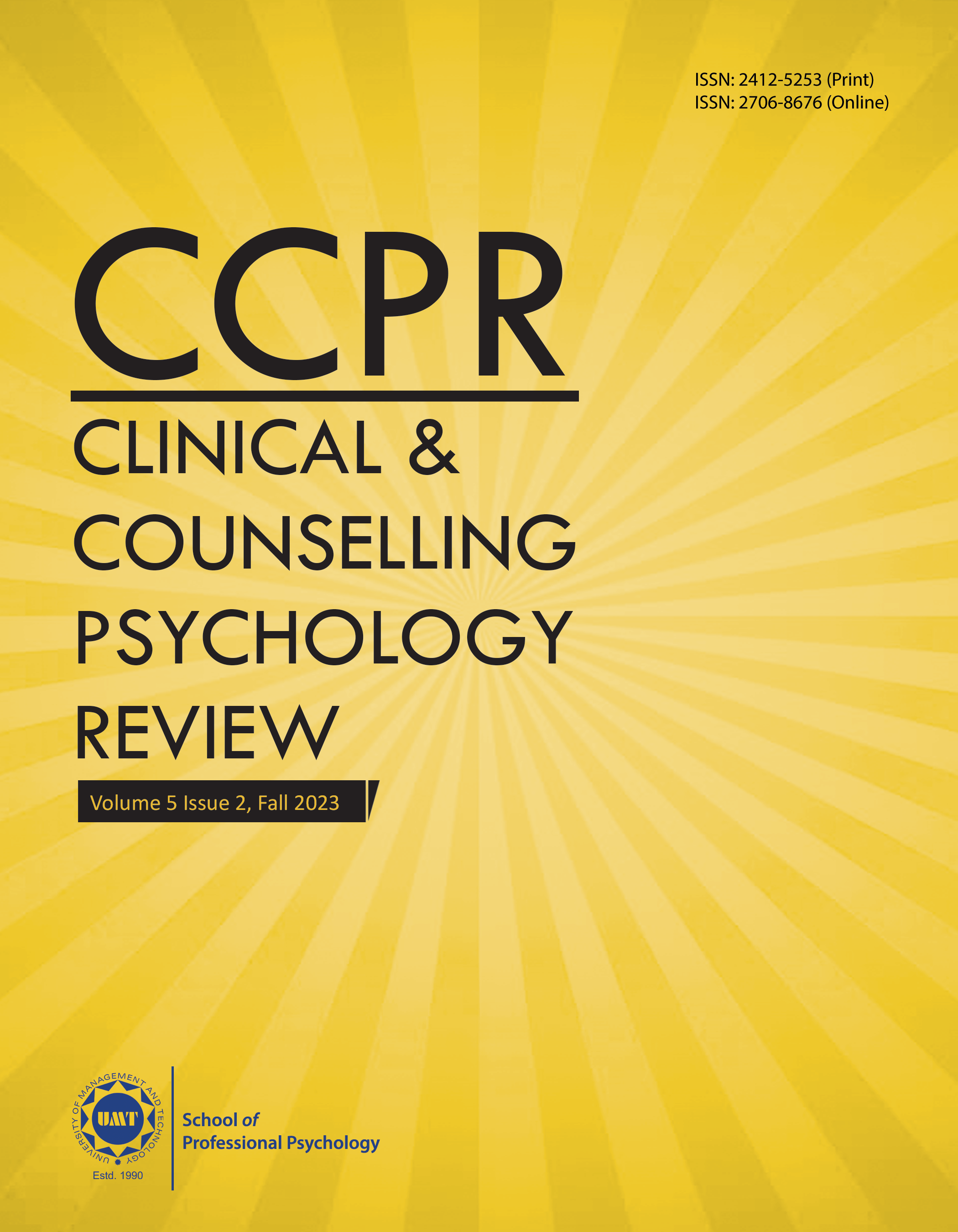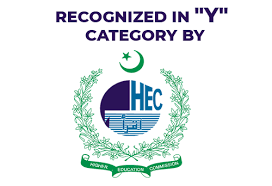Emotion Regulation and Self-Concept as Predictors of Interpersonal Problems in Transgender Population of Pakistan
Abstract
 Abstract Views: 0
Abstract Views: 0
The current study aimed to investigate the psychosocial predictors of interpersonal problems in transgender people of Pakistan. For this purpose, a sample of (n = 72) transgender individuals were recruited through the snowball sampling technique. The Emotion Regulation Questionnaire (ERQ), Personal Self-Concept Questionnaire (PSQ), and Interpersonal Problems Scale (IPS) were used to find out the predicting role of emotion regulation, self-concept, and interpersonal problems in transgender individuals, respectively. Data was analyzed through SPSS (Version 25). The findings revealed a significant positive relationship between all domains of emotion regulation namely awareness, clarity, goals, strategies, and impulse and two domains of interpersonal problems, namely sociability and involved. Only awareness and clarity domains of emotion regulation were found to be inversely correlated with the supportive domain of interpersonal problems. Furthermore, a significant positive association was observed between self-concept and the two domains of interpersonal problems, that is, sociability and involved. However, the two domains of self-concept, namely self-fulfillment and autonomy were observed to be inversely correlated with the supportive domain of interpersonal problems. These findings indicate that demographics (education) is a negative predictor of interpersonal problems. On the contrary, the two domains of emotion regulation (strategy and impulse) are positive predictors of interpersonal problems. Furthermore, one domain of self-concept (autonomy) is also a positive predictor of interpersonal problems. The study has significant theoretical and practical implications considering the Pakistani cultural context.
Downloads
References
Abdullah, M. A., Basharat, Z., Kamal, B., Sattar, N. Y., Hassan, Z. F., Jan, A. D., & Shafqat, A. (2012). Is social exclusion pushing the Pakistani hijras (transgenders) towards commercial sex work? A qualitative study. BMC international Health and Human Rights, 12, Article e32. https://doi.org/10.1186/1472-698X-12-32
Barkham, M., Hardy, G. E., & Startup, M. (1996). The IIP-32: A short version of the Inventory of Interpersonal Problems. British Journal of Clinical Psychology, 35(1), 21–35. https://doi.org/10.1111/j.2044-8260.1996.tb01159.x
Claes, L., Bouman, W. P., Witcomb, G., Thurston, M., Fernandez-Aranda, F., & Arcelus, J. (2015). Non-suicidal self-injury in trans people: Associations with psychological symptoms, victimization, interpersonal functioning, and perceived social support. The Journal of Sexual Medicine, 12(1), 168–179. https://doi.org/10.1111/jsm.12711
Davey, A., Bouman, W. P., Meyer, C., & Arcelus, J. (2015). Interpersonal functioning among treatment-seeking trans individuals. Journal of Clinical Psychology, 71(12), 1173–1185. https://doi.org/10.1002/jclp.22209
Drescher, C, F., Kassing, F., Mahajan, A., & Stepleman, L. M. (2023). The impact of transgender minority stress and emotion regulation on suicidality and self-harm. Psychology and Sexuality, 14 (2), 432–444. https://doi.org/10.1080/19419899.2023.2164867
Gamarel, K. E., Sevelius, J. M., Reisner, S. L., Coats, C. S., Nemoto, T., & Operario, D. (2019). Commitment, interpersonal stigma, and mental health in romantic relationships between transgender women and cisgender male partners. Journal of Social and Personal Relationships, 36(7), 2180–2201. https://doi.org/10.1177/0265407518785768
Gasol, X., Navarro-Haro, M. V., Fernández-Felipe, I., García-Palacios, A., Suso-Ribera, C., & Gasol-Colomina, M. (2022). Preventing emotional dysregulation: Acceptability and preliminary effectiveness of a DBT skills training program for adolescents in the Spanish school system. International Journal of Environmental Research and Public Health, 19(1), Article e494. https://doi.org/10.3390/ijerph19010494
Goñi, E., Madariaga, J. M., Axpe, I., & Goñi, A. (2011). Structure of the Personal Self-Concept (PSC) Questionnaire. International Journal of Clinical and Health Psychology, 11(3), 509–522.
Graziano, P. A., Reavis, R. D., Keane, S. P., & Calkins, S. D. (2007). The role of emotion regulation and children's early academic success. Journal of School Psychology, 45(1), 3–19. https://doi.org/10.1016/j.jsp.2006.09.002
Haliczer, L. A., Woods, S. E., & Dixon-Gordon, K. L. (2021). Emotion regulation difficulties and interpersonal conflict in borderline personality disorder. Personality Disorders: Theory, Research, and Treatment, 12(4), 347–353. https://doi.org/10.1037/per0000436
Hardie, P., Darley, A., Langan, L., Lafferty, A., Jarvis, S., & Redmond, C. (2022). Interpersonal and communication skills development in general nursing preceptorship education and training programmes: A scoping review. Nurse Education in Practice, 65, Article e103482. https://doi.org/10.1016/j.nepr.2022.103482
Hisli Şahin, N., Basim, H. N., & Çetin, F. (2009). Kişilerarası çatişma çözme yaklaşımlarında kendilik algısı ve kontrol odağı [Locus of control and self-concept in interpersonal conflict resolution approaches]. Türk Psikiyatri Dergisi/ Turkish Journal of Psychiatry, 20(2), 153–163.
Irshad, U., Hashmi, A. M., & Aamer, I. (2020). Between a rock and a hard place - Gender dysphoria and comorbid depression in a young, low-income, Pakistani transgender man. Cureus, 12(9), Article e10205. https://doi.org/10.7759/cureus.10205
Kapatais, A., Williams, A. J., & Townsend, E. (2023). The mediating role of emotion regulation on self-harm among gender identity and sexual orientation minority (LGBTQ+) individuals. Archives of Suicide Research: Official Journal of the International Academy for Suicide Research, 27(2), 165–178. https://doi.org/10.1080/13811118.2022.2064254
Kiviruusu, O., Berg, N., Huurre, T., Aro, H., Marttunen, M., & Haukkala, A. (2016). Interpersonal conflicts and development of self-esteem from adolescence to mid-adulthood. A 26-year follow-up. PloS One, 11(10), Article e0164942. https://doi.org/10.1371/journal.pone.0164942
Manzoor, I., Khan, Z. H., Tariq, R., & Shahzad, R. (2021). Health problems & barriers to healthcare services for the transgender community in Lahore, Pakistan. Pakistan Journal of Medical Sciences, 38(1). https://doi.org/10.12669/pjms.38.1.4375
Messinger, A. M., Guadalupe-Diaz, X. L., & Kurdyla, V. (2022). Transgender polyvictimization in the U.S. transgender survey. Journal of Interpersonal Violence, 37(19-20), NP18810-NP18836. https://doi.org/10.1177/08862605211039250
Monell, E., Högdahl, L., Mantilla, E. F., & Birgegård, A. (2015) Emotion dysregulation, self-image and eating disorder symptoms in university women. Journal of Eating Disorders, 3, Article e44. https://doi.org/10.1186/s40337-015-0083-x
Peiffer, H., Ellwart, T., & Preckel, F. (2020). Ability self-concept and self-efficacy in higher education: An empirical differentiation based on their factorial structure. PloS One, 15(7), Article e0234604. https://doi.org/10.1371/journal.pone.0234604
Reeck, C., & Onuklu, N. N. Y. (2022). Interpersonal emotion regulation: Consequences for brands in customer service interactions. Frontiers in Psychology, 13, Article e872670. https://doi.org/10.3389/fpsyg.2022.872670
Saleem, F., & Rizvi, S. W. (2017). Transgender associations and possible etiology: A literature review. Cureus, 9(12), Article e1984. https://doi.org/10.7759/cureus.1984
Sani, S., Mehmood, Q., Jamal, H., Mukhtar, M. U., & Ullah, I. (2023). Raising the alarm: Mental health status of the transgender community in Pakistan. Asian Journal of Psychiatry, 79, Article e103360. https://doi.org/10.1016/j.ajp.2022.103360
Shah, H. B. U., Rashid, F., Atif, I., Hydrie, M. Z., Fawad, M. W. B., Muzaffar, H. Z., Rehman, A., Anjum, S., Mehroz, M. B., Haider, A., Hassan, A., & Shukar, H. (2018). Challenges faced by marginalized communities such as transgenders in Pakistan. The Pan African Medical Journal, 30, Article e96. https://doi.org/10.11604/pamj.2018.30.96.12818
Solbakken, O. A., Ebrahimi, O. V., Hoffart, A., Monsen, J. T., & Johnson, S. U. (2023). Emotion regulation difficulties and interpersonal problems during the COVID-19 pandemic: Predicting anxiety and depression. Psychological Medicine, 53(5), 2181–2185. https://doi.org/10.1017/S0033291721001987
Victor, S. E., & Klonsky, E. D. (2016). Validation of a brief version of the Difficulties in Emotion Regulation Scale (DERS-18) in five samples. Journal of Psychopathology and Behavioral Assessment, 38(4), 582–589. https://doi.org/10.1007/s10862-016-9547-9
Wazir, M. A., & Goujon, A. (2019). Assessing the 2017 census of Pakistan using demographic analysis: A sub-national perspective. Vienna Institute of Demography. https://www.econstor.eu/bitstream/10419/207062/1/1667013416.pdf








